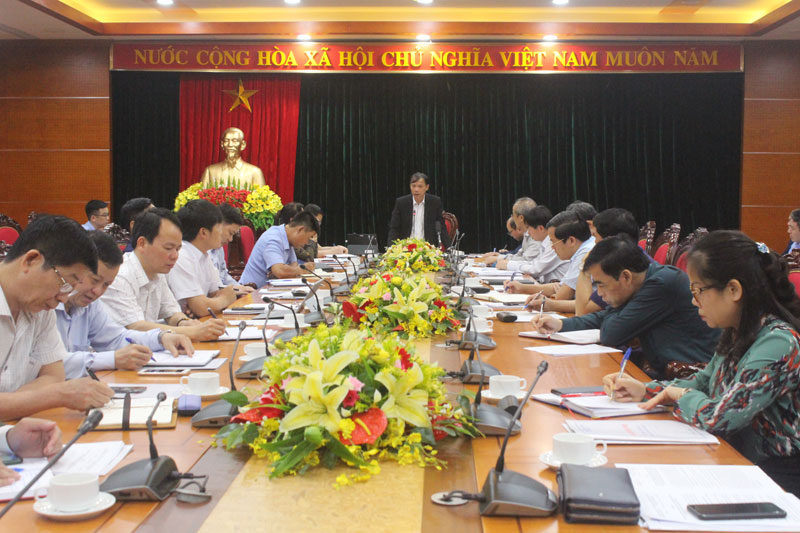
(HBO) - A meeting of the Steering Committee for improving investment and business environment and provincial competitiveness index (PCI) of Hoa Binh province was held on March 10 under the chair of Vice Secretary of the provincial Party Committee and Chairman of the provincial People’s Committee Bui Van Khanh.
 Vice Secretary of the provincial Party Committee and Chairman
of the provincial People’s Committee Bui Van Khanh speaks at the meeting.
Vice Secretary of the provincial Party Committee and Chairman
of the provincial People’s Committee Bui Van Khanh speaks at the meeting.
To improve the locality’s investment and business
environment, the provincial People’s Committee, and relevant department and
sectors organized meetings and dialogues with enterprises, thus seeking measures
to help them remove difficulties facing their business and production.
Attention has been paid to simplifying administrative procedures and fine-tuning
the specialized management and inspection work, contributing to facilitating enterprises’
investment, production and business.
All the enterprises in Hoa Binh implemented online tax declaration. Meanwhile,
commercial banks have focused on improving payment service quality and
developing tools to support cashless payment.
Khanh stressed the necessary to change awareness of local leaders at all levels
and sectors, and civil servants of improving PCI and the quality of public
services.
Priorities should be given to supporting enterprises, especially major ones, to
promote the province’s development, he stressed.
All-level agencies and sectors need to well perform their roles and tasks through
specific actions to create positive changes in improving the investment and
business environment, he noted.
Khanh added that it is necessary to review the real ability of the provincial
centre for investment, trade and tourism promotion, thus assigning suitable
tasks to it.
Relevant departments and sectors, the People’s Committees of districts and Hoa
Binh city were urged to accelerate the land clearance work for investment
projects, and focus on evaluating financial capacity of investors to ensure the
feasibility of investment plans./.
The Standing Board of the Hoa Binh provincial Party Committee has agreed in principle on a proposal by the Standing Board of the Party Committee of Hoa Binh city to gather feedback on the city’s 1:2000 zoning plan, which forms part of its broader urban development strategy.
Hoa Binh province has made notable progress in public administration reform and digital government development, with the satisfaction index among citizens and businesses reaching over 84%, according to recent government evaluations.
Thanks to great efforts by local authorities in recent times, the governance and public administration performance of Mai Chau district has been significantly improved.
In the afternoon of June 6, the Party Committee, the People's Council, the People's Committee and the Fatherland Front of Lac Son district solemnly held a meeting to celebrate the 139th anniversary of the district's founding (1886–2025) and the 79th anniversary of the establishment of the district's Party Committee (1946–2025). There was the attendance of Mr. Bui Van Thang, the Vice Chairman of the Provincial People's Council; Mr. Quach Tat Liem, the Vice Chairman of the Provincial People's Committee; Ms. Dang Bich Ngoc, the Deputy Head of the National Assembly Delegation of the province; as well as the former leaders of the province and district through various periods, who are the natives of the district.
Implementing the Politburo’s Resolution No. 57-NQ/TW on breakthroughs in science – technology, innovation, and digital transformation is a golden opportunity for the northern mountainous province of Hoa Binh to renew growth model, improve competitive edge and shorten digital gap.
Resolution 57-NQ/TW, issued by the Politburo on December 22, 2024, identifies sci-tech, innovation, and digital transformation as strategic breakthroughs to build a developed and prosperous nation. In Hoa Binh province, this spirit is not just a slogan, it’s being put into action through concrete initiatives that form a "new development triangle”: digital citizenship, digital economy, and digital administration.



 Vice Secretary of the provincial Party Committee and Chairman
of the provincial People’s Committee Bui Van Khanh speaks at the meeting.
Vice Secretary of the provincial Party Committee and Chairman
of the provincial People’s Committee Bui Van Khanh speaks at the meeting.